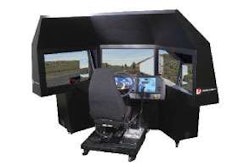Settling for electronic logs

As should be clear by now, government regulators can accomplish many things without actually regulating. The Federal Motor Carrier Safety Administration’s Comprehensive Safety Analysis 2010 initiative has consumed the industry for about a year, and yet not a single rule has changed. The final stage of CSA 2010 – converting to a monthly data-based safety rating – will require a rulemaking, but the agency doesn’t even plan to propose that rule before late spring next year.
FMCSA will achieve many of its goals, however, without changing the rules governing safety fitness determination. The more precise monitoring allowed by the new Safety Measurement System (SMS) will help FMCSA target motor carriers for earlier and more specific intervention. In addition to this nimbler use of enforcement powers, public release of carriers’ Behavior Analysis and Safety Improvement Categories (BASICs) scores could have a huge effect on carriers’ relationships with customers and insurers, among others.
Carriers and their business partners are concerned about how deficiencies in BASICs – especially the pointedly named Unsafe Driving and Fatigued Driving BASICs – will affect juries’ perceptions in accident litigation. This liability concern exists today under SafeStat, but it grows under CSA. The worry isn’t just that names of some BASICs are rather loaded. The core issue is that it will be easier to be deficient in a single BASIC than it has been to be deficient in an entire Safety Evaluation Area.
So even though automated monthly ratings might be months or even years away, many proactive carriers are looking at their data for the Fatigued Driving BASIC and are rushing to adopt, phase in or at least evaluate electronic onboard recorders (EOBRs) to monitor compliance with hours-of-service regulations. Owing to the time weights in the SMS, these companies might be able to avoid warning letters if they can cut log violations sharply this fall.
Bad actors likely won’t get a bye until June 4, 2012.
Many carriers don’t have a problem with log violations. For them, electronic logs would be a solution in search of a problem. On the other hand, many carriers clearly need EOBRs but stubbornly will refuse to install them until FMCSA forces them to do so. Even with the bright spotlight of CSA about to switch on, those carriers are betting – probably correctly – that plenty of shippers and brokers will continue to use them for the right price or service. To the extent these carriers are worried about EOBRs at all, they probably are looking to June 4, 2012, as their day of reckoning. That’s when they face mandatory EOBRs based on the results of a single compliance review.
But if motor carriers with poor hours-of-service compliance think they can get a free ride over the next 20 months, they could face a rude awakening. Once the SMS goes live and thousands of warning letters go out, carriers with poor compliance face escalating intervention. FMCSA already has access to the data, and it’s possible that the agency already is plotting which carriers it will pursue most aggressively once CSA formally takes effect.
In any case, when FMCSA does go after carriers under CSA, they have an arsenal of weapons at their disposal. One pleasant-sounding option is the cooperative safety plan (CSP). Don’t be surprised if FMCSA insists that carriers badly deficient in the Fatigued Driving BASIC “voluntarily” agree to install EOBRs as part of a CSP. And if that doesn’t persuade reluctant carriers, FMCSA can threaten to levy huge fines. In fact, this summer FMCSA settled a proposed fine of more than $75,000 by forgiving nearly $53,000 in exchange for the carrier agreeing to install EOBRs fleetwide within 45 days. So FMCSA already has gone down that road.
In recent years, FMCSA has shown it is not shy about using all the tools at its disposal to go after what it considers to be bad actors. While June 4, 2012, might be the regulatory effective date for mandatory EOBRs, many carriers that would face this penalty probably are destined to do so much earlier than that. n
Avery Vise is Editorial Director of Commercial Carrier Journal.
E-mail [email protected].











